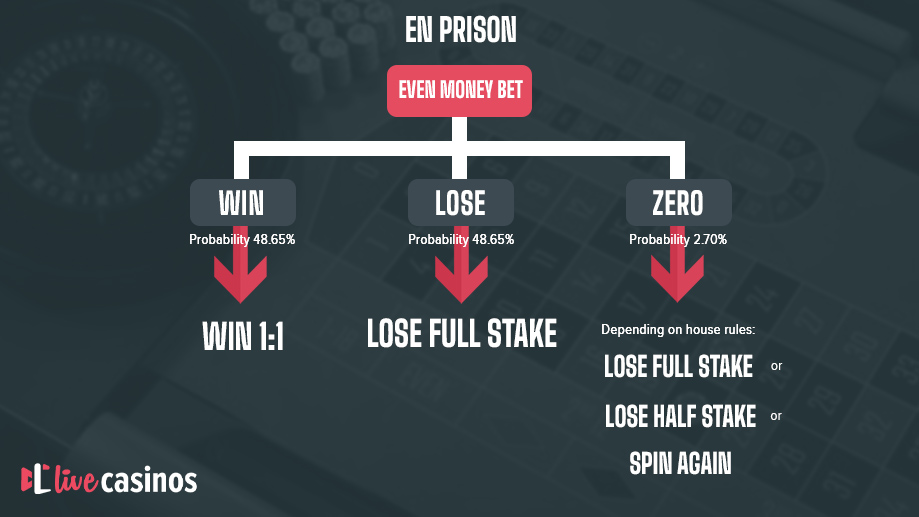Before we dive into the effects and importance of La Partage and En Prison rules, we have to consider some basics of how roulette odds work. That said, we’ll assume you already know the basics of the game and how it plays. If not, refer to our roulette tutorial.
The first thing to understand is that the main ‘culprit’ for the house advantage in roulette is the green zero pocket. Essenitally, roulette payouts are calculated based on 1-in-36 odds for every pocket, even though there are 37 pockets on the wheel.
Think of it this way – an even money bet pays 1:1, which implies it has a 50% chance to win. However, it doesn’t, because the green pocket exists.
For example, almost half of the wheel is red, and almost half of the wheel is black. A bet on Black wins if the ball lands on black, but loses if the ball lands on red or green.
As such, a bet on Black (or any other even money bet) actually wins 48.65% of the time rather than 50% (assuming there is only one zero). However, the bet still pays as if the odds were actually 50%.
Every time the wheel spins, there’s a 1-in-37 chance that the ball will land on 0, which is 2.70%. That’s why the house edge of standard European roulette is 2.70%: exactly the same as the probability of the ball landing on 0.
Importantly, American roulette wheels have two green pockets: 0 and 00. That’s why the house edge in American roulette is double that of European roulette. This makes it strictly worse for players.
La Partage and En Prison rules are never offered with American roulette wheels.
La Partage Rule

The La Partage rule in roulette means that even money bets pay half of their stake back if the ball lands on 0.
The word La Partage means “to share” in French, which largely explains how the rule works in action.
To be clear, the rule kicks in if and only if you have an active even money bet (red, black, odd, even, 1-18, or 19-36) and the ball lands on the zero. In all other cases, the bet is resolved normally.
For example, let’s say you bet $100 on Black. If the ball lands on Black, you win $200 in total. If it lands on Red, you lose your entire stake. However, if it lands on the green zero, you get $50 back.
This means that you lose half as much money whenever the ball lands on 0. From the perspective of expected value, this is the same as if the 0 was half as likely to win – 1.35% instead of 2.70%.
That’s why the La Partage rule reduces the effective house edge of even money bets in roulette to 1.35%.
To be clear, the rule only affects even money bets, so only even money bets have a house edge of 1.35%. All other wagers have the standard HE of 2.70%.
The table below compares all possible outcomes of the Black bet between tables with La Partage and standard European roulette. We’re using the black color bet as an example, but the principle is the same for all even money bets.
Pros
- Lowers effective HE for even money bets
- Lower variance than En Prison
- Consistently reduces losses for relevant wagers
Cons
- Losses to 0 results still lose 50% of stake
- Rarely available
En Prison Rule

The En Prison rule in roulette kicks in if the player makes an even-money bet and the result of the spin is a Zero. When this happens, the player’s stake is ‘frozen’ – the bet is unresolved, but players can’t take back their money either. Instead, the wheel spins again to determine the outcome of the wager.
This second spin can have multiple potential outcomes:
- If the bet wins, the player’s full stake is returned to them
- If the bet loses, the full stake is lost as well
- If the ball lands on 0 a second time, the outcome is determined based on the casino’s rules:
- Some casinos consider the bet lost
- Some casinos simply repeat the process until a conclusive outcome is achieved
- Some casinos return half of the stake back, as with La Partage
En Prison translates to ‘in prison’ from French, which refers to how the stake is ‘imprisoned’ for an additional spin.
This rule means that you get 100% of your stake 50% of the time whenever you lose an even money bet because the ball landed on 0. Statistically speaking, that’s the same as getting 50% of your stake 100% of the time – which is how La Partage works.
In other words, even money bets with the En Prison rule enabled have a 1.35% house edge – the same as with La Partage.
We should note that tables that consider the bet lost if the ball lands on 0 a second time technically have a slightly higher house edge. However, the probability of hitting a 0 twice in a row is around 0.074%, which is statistically insignificant.
Pros
- 50% chance for full recovery
- Higher variance means that it performs better if you’re lucky
- Lowers effective HE for even money bets
Cons
- Ties up your stake for at least one more spin
- Performs worse than La Partage if you’re unlucky
- Even rarer – currently not available in any live casino game
None (Default Rules)
Most roulette tables do not use La Partage or En Prison. As such, the lack of these rules is often considered the ‘default’ for most games.
In this case, even money bets do not have any special rules attached to them. If the ball lands on zero, the bet loses.
This means that the house edge for even money bets is 2.70% – the same as with all other types of wagers.
Statistically speaking, such tables are strictly worse for players because of their higher effective house edge. There are no upsides to not having La Partage or En Prison. The only real advantage is that single-zero wheels are still strictly better than double-zero wheels.
On the other hand, such standard European roulette games are available in pretty much any casino, online or otherwise. It’s safe to say that 95% of all European roulette wheels fall into this category, which makes them readily available to all players.
Direct Comparison
Importantly, a single table can use either La Partage or En Prison, not both.
With that in mind, here’s a direct comparison between these rules and the default (lack of either).
Key takeaway: La Partage & En Prison both reduce the house edge of even money bets to 1.35% but differ in risk profile.
Broadly speaking, tables with either of these rules are strictly better than default rules for roulette. Statistically, they’re the same because they produce the same outcome on average. However, they perform differently in action:
- La Partage is safer and more consistent because it provides the same outcome every time it’s triggered.
- En Prison is somewhat riskier – it either gives you back your full stake or nothing at all. As such, it can perform better or worse than La Partage, depending on how lucky you are.
Where to Find These Rules Online
Due to the history and French-language names of these rules, tables that employ either La Partage or En Prison rules are typically called French Roulette.
The term is used regardless of whether the rule in use is La Partage or En Prison.
Either way, such tables are quite rare in online casinos – especially if you’re looking to play a live dealer variant.
However, there are several live casino French Roulette games available right now:
To our knowledge, no live casino games currently offer the En Prison rule. This is likely due to the difficulty of implementing this rule into an online setting – forcing players to lock up their stakes is not a viable option for online play.









































 Roulette
Roulette
 Blackjack
Blackjack
 Baccarat
Baccarat
 Poker
Poker
 Sic Bo
Sic Bo
 Dragon Tiger
Dragon Tiger
 Game Shows
Game Shows  Top 5 Games
Top 5 Games  See more
See more  Roulette Casinos
Roulette Casinos  Low Limit
Low Limit  High Limit / VIP
High Limit / VIP  Exclusive
Exclusive  How to Play
How to Play  Basic Strategy
Basic Strategy  Top Tips
Top Tips  FAQ
FAQ  Blackjack Casinos
Blackjack Casinos  Baccarat Casinos
Baccarat Casinos  Bonuses
Bonuses  Poker Casinos
Poker Casinos  Game Providers
Game Providers  Sic Bo Casinos
Sic Bo Casinos  Dragon Tiger Casinos
Dragon Tiger Casinos  Credit and Debit Card
Credit and Debit Card  e-Wallet
e-Wallet  Cryptocurrency
Cryptocurrency  Bank and Checks
Bank and Checks  Pay by Phone and SMS
Pay by Phone and SMS  See more
See more  How-To Guides
How-To Guides  Top Lists
Top Lists  In-Depth
In-Depth  Strategy
Strategy  Casino & Games
Casino & Games  Insight
Insight  News
News  Promotions
Promotions 
 Guide to Live Casinos
Guide to Live Casinos  Top 10 Live Casino Tips
Top 10 Live Casino Tips  Studio Locations
Studio Locations  FAQ & Help
FAQ & Help  Meet The Dealers
Meet The Dealers  Our Awards
Our Awards  How We Rate
How We Rate  Responsible Gambling
Responsible Gambling 




























 ENG
ENG 








 Facebook
Facebook
 Pinterest
Pinterest
 Twitter
Twitter
 LinkedIn
LinkedIn
 Copy Link
Copy Link 
























